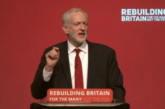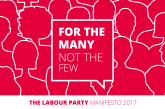A bigger government deficit means a private sector surplus.
In 2014 Ed Miliband was ridiculed by the Conservatives and the right-wing media for forgetting to mention the deficit in his party conference speech. During the 2017 Conservative Party conference however, the deficit was barely mentioned. In fact, Theresa May is now talking about taking a “balanced approach” to the economy – whatever that means.
The obsession with avoiding an increase in the deficit is never more evident than when it comes to spending on public services, where the first question asked is “How are you going to pay for it?”. The reality is that a bigger deficit wouldn’t wreck the UK’s finances and that in fact the current obsession with cutting the deficit prevents increasing living standards and poses a huge risk to our future economic stability. Labour is rightly moving away from using deficit as a guide to public policy. Instead they are focusing on advancing policies aimed at raising living standards and delivering the public investments in education, social housing, green energy and infrastructure that are critical for long-term prosperity.
Right now, our nation is crying out for public investment. Although we are being told that Labour’s math doesn’t add up, the shadow treasury team is wisely looking beyond the government’s short-term balance sheet. In the long run, the math does indeed add up.
When the government spends more than it gets in taxes, it means there is a surplus in the private sector which can be used for private sector spending or savings. Suppose the government spends £1 billion into the economy but collects just £900 million in taxes, leaving behind an extra £100 million for businesses or households to hold. That extra £100 million gets recorded as a surplus on the private sector books. That means that the government’s -£100 million is always matched by +£100 million in another part of the economy. The government’s deficit is always mirrored therefore by an equivalent surplus in another part of the economy. Many of us hear only of a budget deficit, but never of the matching surplus on the other side. As a result, we end up applauding efforts to balance the budget, even though it leads invariably to erasing the surplus in the private sector.
We should think of the government’s spending as self-financing since it pays its bills by sending new money into the economy. When there’s a deficit, some of that new money can be traded in for a government bond. What’s often missed in the public debate is the fact that the money to buy the bond comes from the deficit spending itself.
What isn’t missed is the fact that the government pays interest on those bonds. The Tories are obsessed with this line item in the budget, as if it’s akin to a shopping bill that keeps taking a bigger and bigger bite out of a household budget. It certainly isn’t.
Unlike a household, the government doesn’t have to trim other parts of its budget to make ends meet as it has the means to create more money. A sovereign government with its own currency can always create room in the budget to put more resources into education, infrastructure, defence and so on. It is purely a political decision not to do so.
Of course, there are real limits to what can be done. No country can commit to large-scale infrastructure investment unless it has the available labour, machinery or raw material for manufacturing and construction. The skill that any government should demonstrate is its ability to fulfil its fiscal responsibility to make efficient use of the people, factories and raw materials we have to deliver the optimum use of its investments.
But we are living in a reality where the very words “debt” and “deficit” have been weaponised for political ends. They are the tool that’s used to deny resources to struggling communities or to demand cuts to essential public programs.
There is an undisputed need for public investment aimed at raising living standards and delivering the public investments that are critical for long-term prosperity of the many.
The Labour Party is determined to avoid fruitless battles over inaccurate portrayals of debt levels and instead have created a clear and economically viable plan to protect the future of our economy and fight against inequality, poverty and economic stagnation.






